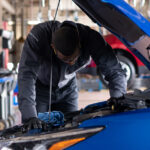Hydroplaning can occur when your Chevrolet tires lose contact with the road due to a thin layer of water, resulting in a sudden loss of steering and braking control. At Reedman Toll Chevrolet Springfield, we want you to stay safe in wet conditions by understanding driving strategies and the vital role of tire maintenance in preventing hydroplaning.
How Chevrolet Tires Help Prevent Hydroplaning
Your tires are your first line of defense against slick roads. Traction is compromised when water builds up faster than your tires can channel it away. That’s why your Chevrolet tires must be in optimal condition to ensure safety.
Tread depth plays a major role—worn tires with shallow tread can’t cut through standing water effectively. It’s equally important to maintain proper tire pressure. Underinflated or overinflated tires reduce your ability to grip wet surfaces and increase hydroplaning risk.
Driving in the Rain: Safety Tips for Chevrolet Owners
Even with quality tires, safe driving practices are essential. Start by slowing down. Hydroplaning is more likely at higher speeds, so reducing your speed in wet conditions gives your tires more time to displace water. Driving in the tracks left by other vehicles can also improve grip, as those areas have less standing water.
If you start to hydroplane, don’t panic. Ease off the accelerator, keep the steering wheel steady, and avoid hard braking until you regain traction.
Stay Ahead with Chevrolet Tire Maintenance
Whether you’re navigating sudden summer storms or daily commutes, your Chevrolet tires need to be ready for anything. Visit Reedman Toll Chevrolet Springfield for expert tire services, pressure checks, tread inspections, and more. Explore Chevrolet tire care options and drive with confidence, rain or shine.






